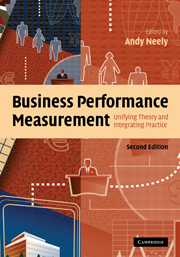Book contents
- Frontmatter
- Contents
- List of figures
- List of tables
- List of boxes
- List of contributors
- Introduction
- Part I Performance measurement – functional analyses and theoretical foundations
- Part II Performance measurement – frameworks and methodologies
- 7 Performance measurement frameworks: a review
- 8 Beyond budgeting to the adaptive organization
- 9 Theoretical conditions for validity in accounting performance measurement
- 10 The validity of measurement frameworks: measurement theory
- Part III Performance measurement – practicalities and challenges
- Part IV Performance measurement in public services
- Part V Performance measurement – emerging issues and enduring questions
- Index
- References
9 - Theoretical conditions for validity in accounting performance measurement
Published online by Cambridge University Press: 22 September 2009
- Frontmatter
- Contents
- List of figures
- List of tables
- List of boxes
- List of contributors
- Introduction
- Part I Performance measurement – functional analyses and theoretical foundations
- Part II Performance measurement – frameworks and methodologies
- 7 Performance measurement frameworks: a review
- 8 Beyond budgeting to the adaptive organization
- 9 Theoretical conditions for validity in accounting performance measurement
- 10 The validity of measurement frameworks: measurement theory
- Part III Performance measurement – practicalities and challenges
- Part IV Performance measurement in public services
- Part V Performance measurement – emerging issues and enduring questions
- Index
- References
Summary
Introduction
The concept of truth is a foundation upon which the accounting profession has built its reputation. The need for truth in accounting is enshrined in ethical codes, accounting regulations, authoritative texts and, of course, the auditor's assignation of a “true and fair view”. MacNeal, in his classic critique of accounting, has emphasized the salient role of truth for the accountant:
Accounting is the language of finance. Members of the accounting profession are interpreters upon whom the vast majority of people must rely for information … If interpreters do not tell the truth, or tell truths intermixed with half truths, many people will be deceived to their hurt.
(MacNeal, 1970[1939], 1)The absence of truth from accounting information, or, indeed, even doubts about its presence, can have profound effects upon the accounting profession, its operation and its regulation. For example, in the United Kingdom in the late 1960s and 1970s the criticism of the flexibility of accounting practice during the GEC/AEI merger and the Leasco Pergamon affair preceded and triggered the implementation of a national system of accounting standardization (Stamp and Marley, 1970; Leach and Stamp, 1981; Stamp 1985). More recently, in the United States, the Enron scandal, and subsequently the Worldcom scandal, destroyed a leading international firm of accountants – Arthur Andersen – and led to a marked strengthening of formal corporate governance regulations.
Truth is, therefore, a very practical and immediate issue for accountants.
Information
- Type
- Chapter
- Information
- Business Performance MeasurementUnifying Theory and Integrating Practice, pp. 179 - 217Publisher: Cambridge University PressPrint publication year: 2007
References
Accessibility standard: Unknown
Why this information is here
This section outlines the accessibility features of this content - including support for screen readers, full keyboard navigation and high-contrast display options. This may not be relevant for you.Accessibility Information
- 14
- Cited by
